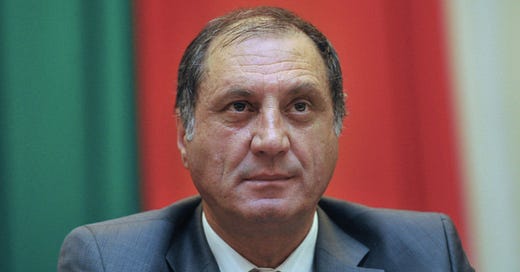Russia Suspends Aid to Abkhazia: Challenges and Cooperation
Sergey Shamba confirmed that Russia has already suspended financial support to Abkhazia as of 1 September 2024.
The leaked "Bzhania-Kozak" document continues to dominate Abkhazian political discourse. The document’s revelation has intensified calls for President Bzhania's resignation, following a heated opposition gathering. Focus has now shifted to the parliament’s response, with concerns mounting over potential repercussions for lawmakers who resist Russian-backed proposals, including the so-called "Apartment Law" and the implementation of a "Foreign Agents" law. In this charged atmosphere, Foreign Minister Sergey Shamba has broken his silence, addressing the unfolding crisis.
The controversial document outlines a series of demands from Moscow that could significantly reshape Abkhazia's political and economic landscape. These include removing restrictions on Russian citizens purchasing real estate in Abkhazia and the potential revocation of Russian citizenship from Abkhazian deputies opposing certain Russian-backed legislation.
During a press briefing, Shamba provided further details about the meeting between President Aslan Bzhania and Dmitry Kozak, Deputy Head of the Russian Presidential Administration. "Aslan Bzhania's meeting with Dmitry Kozak took place on 19 August, and the protocol was drawn up on 26 August," Shamba clarified.
Russia Suspends Aid to Abkhazia: Yushchenko on Challenges and Cooperation
In an interview with RTVI, State Duma Deputy Alexander Yushchenko highlighted the importance of ratifying the agreement on mutual recognition of judicial decisions. He emphasised that, while it is necessary to harmonise jurisdictions, one must also bear in mind Abkhazia’s status as an independent state. Issues related to jurisdiction require discussion and compromise between the parliaments of both countries.
"The first issue concerns the ratification of the agreement on mutual recognition of judicial and arbitration decisions. Yes, it is necessary to align arbitration courts, but we must not forget that Abkhazia is also a sovereign state. If, for example, the jurisdiction of Russian courts extends to Abkhazia, then logically, the jurisdiction of Abkhazian courts should also apply in Russia. This is a topic of some debate, and I believe it can be discussed within the framework of the friendship group with Abkhazian parliamentarians, who, in turn, should hold broader discussions with elders and political forces to arrive at a compromise. After all, standing still is not an option."
Regarding restrictions in the commercial real estate market for Russian investors, Yushchenko noted that Russian citizens are allowed to purchase any commercial property, such as a business or an established hotel. "Yes, there is a contentious issue concerning apartments, and a law does need to be passed. However, the wording must be carefully revised."
"We need to regulate the quantity (starting with pilot projects, rather than tens of thousands of units), and perhaps demonstrate the positive impact of construction for the citizens, ensuring that it satisfies the majority of the Abkhazian population. The issue needs to be addressed comprehensively. But I have a counter question: in Russia, an apartment law was also introduced, submitted to the State Duma multiple times, and rejected repeatedly because it wasn’t thoroughly prepared."
Omar Smyr: “No Plans for Harmonisation of Laws on Apartments, Business Privileges, or Energy”
According to the leaked protocol, Russia is advocating for the removal of restrictions on Russian investors in the commercial real estate market, the ratification of an agreement on the mutual recognition of judicial and arbitration decisions, and the implementation of investment projects by Russian legal entities in Abkhazia.
Yesterday, on 5 September, the official website of the Cabinet of Ministers of the Republic of Abkhazia published information from the Ministry of Economy concerning the harmonisation of legislation between the Republic of Abkhazia and the Russian Federation.
Lawyer Omar Smyr commented on the Ministry of Economy's statement regarding the legislative harmonisation between Abkhazia and Russia through his Facebook page. He also shared documents, including Presidential Order No. 401 from 31 October 2019, and a letter from the Prime Minister of the Republic of Abkhazia, dated 3 December 2019, which outlined a plan for the unification of legislation (as opposed to harmonisation), stating: "Pay attention to which specific laws the previous government planned to unify. Compare this with what was approved in 2020 and 2024."
His full comments are below:
I read with great interest the information provided by the Ministry of Economy of the Republic of Abkhazia. I find it necessary to provide a commentary on its content.
Article 23 of the Treaty of Friendship, Cooperation, and Mutual Assistance between the Republic of Abkhazia and the Russian Federation, dated 17 September 2008, states that "The Contracting Parties will take measures to unify the legislation governing economic activities, including civil and tax legislation, as well as legislation in the field of social protection of the population and pension provision."
Liana Kvarchelia: The Government Should Have Adapted to Life Without Subsidies
"The Abkhaz authorities should have been prepared for the inevitable reduction in aid. Russian high-ranking officials had already warned about this back in 2022. The government should have adapted to life without subsidies. How can the financial shortfall be compensated? By supporting local businesses, bringing the shadow economy into the open, enforcing real financial discipline, reducing the bureaucratic apparatus, and significantly cutting unnecessary expenses such as luxury cars and free fuel for officials and deputies. Eliminating corporate events, pointless business trips, and other excesses is also essential. Yet, we are being told that the only way to generate income is by selling real estate to foreigners."
― Liana Kvarchelia, Deputy Director of The Center for Humanitarian Programs.







